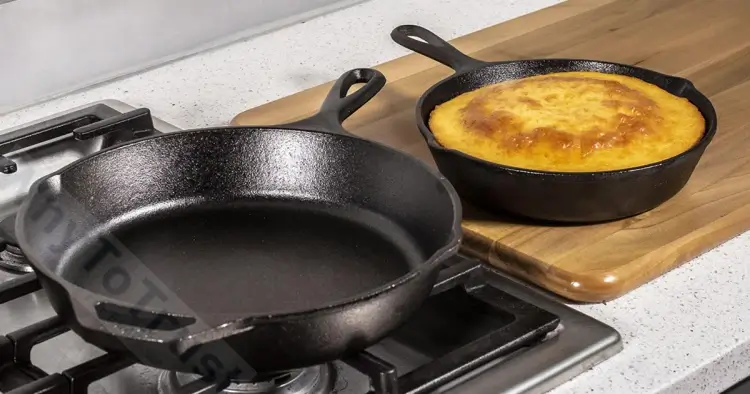A cast iron skillet is a kitchen staple that has been used for centuries. These heavy, durable pans are perfect for a wide range of cooking tasks, from searing steaks to baking bread.
Benefits of Cooking with a Cast Iron Skillet
Cooking with a cast iron skillet has many benefits that make it a favorite among home cooks and professional chefs alike. Here are some of the top reasons to use a cast iron skillet in your kitchen:
Durability
One of the biggest advantages of a cast iron skillet is its durability. These pans are made from a single piece of cast iron, which means they are incredibly strong and resistant to wear and tear. In fact, a good quality cast iron skillet can last for decades with proper care. This makes them an excellent investment for any home cook.
Even Heat Distribution
Another reason why a cast iron skillet is a kitchen essential is its ability to evenly distribute heat. Cast iron is an excellent conductor of heat, which means that it can hold onto heat for a long time. This makes it perfect for tasks like searing steaks, where a high, even heat is essential.
Versatility
A cast iron skillet is also extremely versatile. It can be used on the stovetop, in the oven, and even over a campfire. This makes it a great all-purpose pan that can handle a wide range of cooking tasks. From frying eggs to baking a pie, a cast iron skillet can do it all.
Non-Stick Surface
Despite its rugged appearance, a well-seasoned cast iron skillet actually has a naturally non-stick surface. This means that you can cook a wide range of foods in it without the need for added oils or sprays. This not only makes for healthier cooking, but it also makes cleaning up a breeze.
Adds Nutrients to Your Food
Another benefit of cooking with a cast iron skillet is that it can add nutrients to your food. When you cook with cast iron, small amounts of iron are absorbed into the food. This can be especially beneficial for people with iron deficiencies or anemia.
How to Season a Cast Iron Skillet?
One of the keys to getting the most out of your cast iron skillet is proper seasoning. Seasoning is the process of creating a non-stick surface on your pan by coating it with oil and heating it up. Here’s how to season a cast iron skillet:
- Start by washing your skillet with hot, soapy water. Be sure to scrub away any dirt or grime, but be careful not to use too much soap or you’ll remove the pan’s natural seasoning.
- Once your skillet is clean and dry, rub a thin layer of vegetable oil all over the surface of the pan. You can use any type of oil, but some popular options include flaxseed oil and coconut oil.
- Preheat your oven to 350 degrees F (180 degrees C).
- Place your skillet upside down on the top rack of your oven. This will help to prevent any excess oil from dripping onto the bottom of the oven.
- Bake your skillet for one hour. After an hour, turn off the oven and let the skillet cool inside.
- Once your skillet has cooled, it’s ready to use. Remember to always wipe away any excess oil before cooking, and to re-season your skillet every few months to keep it in top condition.
Tips for Maintaining Your Cast Iron Skillet
Now that you have a well-seasoned cast iron skillet, it’s important to take care of it to ensure it stays in good condition. Here are a few tips for maintaining your cast iron skillet:
- Avoid using metal utensils. While a cast iron skillet is durable, it can still be scratched by metal utensils. To avoid damaging your pan, use wooden, silicone, or nylon utensils instead.
- Don’t soak your skillet. Cast iron pans are not meant to be soaked in water for long periods of time. If you need to wash your pan, use hot water and a scrub brush to remove any stuck-on food. Then, dry the pan thoroughly before seasoning it again.
- Avoid using harsh detergents. While it’s important to keep your skillet clean, you should avoid using harsh detergents or abrasive sponges. These can strip away the pan’s seasoning and make it more prone to rust.
- Store your skillet properly. To prevent rust, it’s important to store your cast iron skillet in a dry place. If you have to stack your pans, place a paper towel or a layer of cloth between them to prevent scratching.
- Re-season as needed. As mentioned earlier, it’s important to re-season your cast iron skillet every few months to maintain its non-stick surface. You can tell it’s time to re-season your pan when food starts to stick or the surface looks dull and dry.
Conclusion
A cast iron skillet is a kitchen essential that every home cook should have in their arsenal. From its durability and even heat distribution to its versatility and non-stick surface, a cast iron skillet is a true workhorse in the kitchen. With proper care and maintenance, it can last for decades, making it an excellent investment for any home cook.

